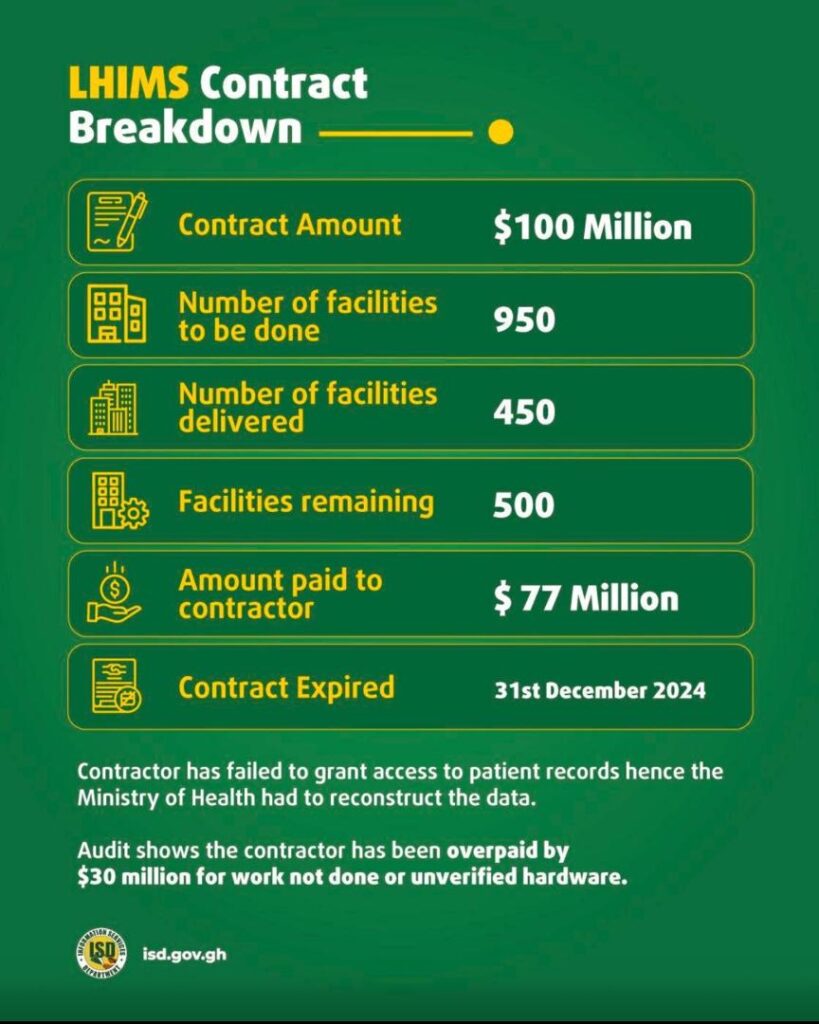Investigative Report Uncovers Owner Profile, Contract Discrepancies, and Systemic Failures
By Gifty Boateng
The Government of Ghana has terminated the US$100 million contract with the Indian-based vendor responsible for the Lightwave Health Information Management System (LHIMS), a digital platform previously used to manage patient records nationwide. This decisive move comes after mounting evidence of poor system performance, questionable contract terms, and escalating concerns over data sovereignty and security.
The LHIMS contract, signed under the previous Akufo-Addo administration, was awarded to a company reportedly operating out of the Movempic hotel building in Accra. Despite its significant financial scope, the company’s declared stated capital was a modest GH₵10,000, raising questions about its capacity to deliver on such a large-scale national project.
Investigative findings point to Sampson Djaba as the beneficial owner of the vendor. Djaba is known for his affluent lifestyle in Atlanta, Georgia, where he resides and remotely oversees the digital operations of LHIMS. The company’s physical presence in Ghana was limited, with no substantive local operations, and all critical servers hosted outside the country, specifically in India.
Minister for Health, Kwabena Mintah Akandoh, formally announced the termination of the LHIMS contract at the Government Accountability Series platform on Wednesday, October 29. Akandoh cited abysmal performance, contractual blackmail, and a lack of local oversight as primary reasons for the decision. He emphasized, “Ghanaians will never go back to the manual way. We are moving forward responsibly, confidently, and decisively.”
The Minister revealed that the vendor’s remote control of the system enabled him to make demands at will, with the ability to shut down hospital data access if authorities failed to comply. This practice led to widespread chaos and operational disruptions within healthcare facilities across the country.
In response to the system shutdown, the government has initiated a two-week transition plan to restore and stabilize hospital data management using the newly implemented Ghana Healthcare Information Management System (GHIMS), which is expected to provide greater transparency and reliability.
The abrupt shutdown of LHIMS left hospitals nationwide grappling with data access interruptions, affecting patient care and administrative efficiency. Healthcare providers reported significant delays and confusion as records became inaccessible, underscoring the risks of external system control and lack of contingency planning.
To mitigate further disruption, the Ministry of Health has prioritized the rollout of GHIMS, aiming to ensure a seamless transition and restore confidence in the nation’s digital health infrastructure.
An official audit of the LHIMS contract revealed numerous performance gaps, including inadequate data protection measures, unreliable hardware infrastructure, and discrepancies in financial reporting. The audit highlighted that the system failed to meet key operational benchmarks, with critical components either underperforming or entirely absent.
Financial scrutiny exposed inconsistencies between the contract’s stated value and the actual investment in hardware and software. The audit recommended a comprehensive review of procurement practices and called for accountability among officials involved in the initial contract approval.
A major point of contention was the location of LHIMS servers, which were operated and maintained in India under the sole authority of Sampson Djaba. This arrangement posed significant risks to Ghana’s data sovereignty, with sensitive patient information controlled outside national jurisdiction. The Minister underscored the urgency of bringing data management back under local oversight to prevent future vulnerabilities.
The government has referred the matter to the Attorney-General for further investigation, with several implicated individuals expected to face legal scrutiny. Policy stakeholders have called for stricter vetting of future technology vendors and more robust enforcement of data protection standards.
The termination of the LHIMS contract marks a turning point in Ghana’s approach to digital health management. The government’s swift action, coupled with the introduction of GHIMS, reflects a renewed commitment to data security, operational transparency, and sustainable healthcare innovation. Stakeholders hope that lessons learned from the LHIMS debacle will inform future procurement and oversight practices, safeguarding the country’s healthcare system against similar risks.Legal Blow for Adu


